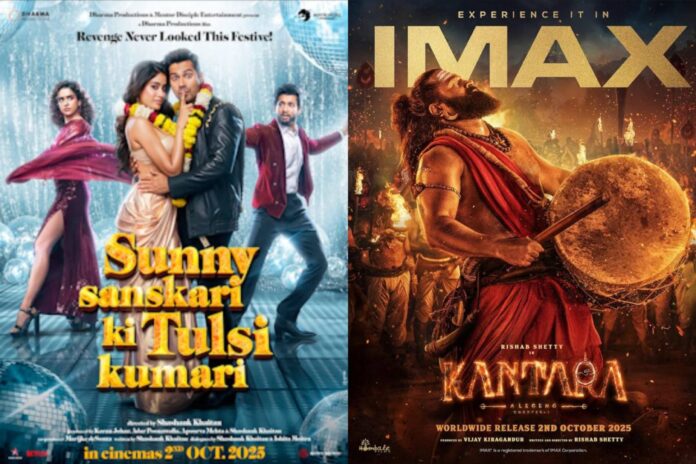Since many of the big films are, these days, distributed by one distributor for the whole of India, the tension gets multiplied many times over. In the good old days, there were distributors for each circuit, and they were concerned about getting shows for their film in their territory only. At that time, there was dominance of single-screen cinemas. Of course, there were chain holders — exhibitors who owned several cinemas or controllers who did the bookings for multiple cinemas in a circuit. But today, national multiplex chains have presence in each and every territory. And since the all-India distributors bargain for shows in cinemas across the country, their tensions are compounded because of the sheer number of cinemas and, therefore, shows therein.
After COVID-19 also, there have been instances of two or more big films releasing in the same week. For instance, on Independence Day last year, Stree 2 hit the screens along with Khel Khel Mein and Vedaa. In the Independence Day week in 2023, the competition was between Gadar 2 and Oh My God 2. Similarly, on Diwali 2024, the war was between Singham Again and Bhool Bhulaiyaa 3. There were showcasing tensions galore during each of these occasions but still, Stree 2 managed an opening day (Independence Day) collection of Rs. 52.40 crore in spite of sharing screen space with two star cast films! Gadar 2 and Oh My God 2 recorded opening days of Rs. 40.10 crore and Rs. 9 crore respectively. On their fifth day (which was the national holiday for Independence Day), the films netted Rs. 55.40 crore and Rs. 16.50 crore respectively. The initial day’s net collection total of Singham Again was Rs. 40 crore while that of Bhool Bhulaiyaa 3 was Rs. 32 crore. In other words, there is enough space for two and even three films in a week, but the tensions which precede the day of release as far as clamouring for shows is concerned are not worth it.
Then why is this Dassera, which falls on 2nd October, so different? To take advantage of the festive occasion, both the big releases of next week — Kantara A Legend: Chapter 1 (dubbed) and Sunny Sanskari Ki Tulsi Kumari — will hit the screens on Thursday (October 2) instead of Friday. The tug of war has already started, with the all-India distributors of both the films — AA Films for Kantara A Legend: Chapter 1 (dubbed); Dharma Productions for Sunny Sanskari Ki Tulsi Kumari — trying to get the maximum number of screens and shows for their respective films. No harm in that as it is natural for each of the two distributors to look after his business interest. But as far as the exhibitors are concerned, they are in the unenviable position of having to balance the two films in allotment of shows and screens. And the ‘settlement’ of the exact number of screens and shows is not going to happen soon; it may go on till as late as Wednesday. Had the film been slated for release on Friday, the tension would’ve continued till Thursday midnight.
AA Films has written to exhibitors all over India that there would be no sharing of shows in the case of IMAX screens, single-screens, and multiplexes with one, two and three screens. The distributor has then gone on to specify the number of shows its Kantara A Legend: Chapter 1 (dubbed) would need in multiplexes with more than three screens, specifying the exact number for every class of multiplex based on screen count. This would imply that those cinemas (single-screen and multiplexes) which do not comply with the demand of AA Films would not be granted permission to screen the dubbed film in lesser shows. In other words, if a cinema decides not to toe the line of AA Films, he would not get to screen the film at his cinema. If he owns multiple cinemas, he may be in fear of losing the screening rights of the film at each and every cinema of his if he decides to change the scenario in even one or two cinemas. Point to note is that of the films mentioned above and released in 2024 and 2023, Stree 2 had taken the biggest opening (of Rs. 52.40 crore) in spite of two more star cast films releasing alongside it. Then why does Kantara A Legend: Chapter 1 (dubbed) need so many shows? It is almost appearing as if the makers of the Kantara… (dubbed) sequel don’t want Sunny Sanskari… to get any shows anywhere!
Of course, the bond of friendship between Anil Thadani, owner of AA Films, and Karan Johar, one of the owners of Dharma Productions, is so strong that the showcasing matter will get resolved amicably but the questions that arise are twofold: (i) why such a ridiculous condition by any distributor?; and (ii) why does the solution have to lie in the fact that the two distributors are bosom pals? Frankly, it is not every time that the distributors of the two films releasing in one week are friends. The game has become so dirty that distributors don’t care for the film of the rival distributor. In the good old days, distributors believed in the give-and-take policy but the competition is so cut-throat today that the policy distributors seem to understand is only one of I-me-my-film-others-don’t-matter. There is at least one all-India distributor (North India-based) who is so self-centred that he has been giving sleepless nights to exhibitors and programmers. Cinema wallahs loathe it when he has a film on release and if there’s another big film competing with his big film, because in such cases, this particular distributor is not just concerned that his film should get the best showcasing but also hell-bent on ruining the chances of the other film. And towards this end, this selfish distributor blocks more screens and shows than what his film warrants just so that the other film doesn’t get any benefit. This dog-in-the-manger policy of the distributor prompts him to badmouth the other distributor’s film so as to prompt exhibitors and programmers to reduce the number of screens and shows being allotted to the rival film. Although not a single distributor or exhibitor has a good word for this particular distributor, there are others too who are mean and conceited. Such distributors also adopt unfair means to ensure that a competing film doesn’t get a fair chance to breathe in the cinemas. Anil Thadani has been known to be a very fair person and, therefore, this stance of his in the case of Kantara A Legend: Chapter 1 seems unusual. Maybe, it is the instructions of the film’s producer that he is following.
All of this could easily pass off as being loyal to one’s film, but there’s a difference between being faithful to your own product and ruining the chances of another’s film. Besides the distributor of the film at the receiving end, who also suffer due to this showcasing battle are the exhibitors/programmers/controllers/bookers. Since the war between the distributors of the two new releases often goes on till the eleventh hour, these show allocators have to use all their persuasion powers to make both the sides understand. It is very common for such show allocators to work till late in the night prior to the Friday of release. Most of them suffer from high blood pressure and other lifestyle diseases because of the immense tension involved in their work. An exhibitor revealed, “My wife has told me countless times to shut down my business because it is not worth the tension I have to go through every other week.” A programmer, in his mid-thirties rued the state of affairs in the trade and revealed, “We have no time for our children and family. The work pressure is slowly killing us.”
The funniest part is that after watching the public reaction to the films, exhibitors, mostly the multiplex owners/programmers/controllers, change the showcasing — sometimes from Saturday itself, at other times after the first weekend — without so much as even informing the distributors concerned. In other words, the distributor who had an upper hand on Friday — for whatever reason — could end up with far lower number of shows than what he fought for if the public reports of his film do not warrant the number of shows allocated to his film. Which makes one wonder: are the distributors doing all this simply because they are on an ego trip? When the public is the final judge, why should there be so much tension, uncertainty, heartburn and badmouthing? Just why?





























